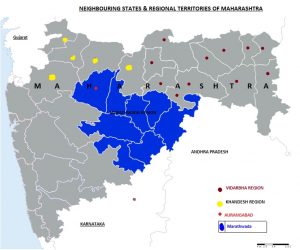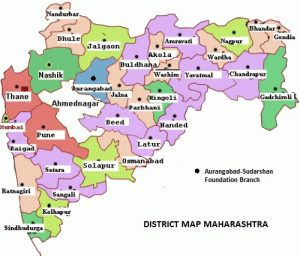
The Sudarshan Foundation Aurangabad Chapter
RESEARCH PROJECT – I
PILOT PROJECTS OF AURANGABAD CHAPTERS alias ‘RURAL SOUTH ASIA NETWORK’
DATE OF BEGINNING: SINCE 2010
With times the work of the Sudarshan Foundation now seeks broader avenues to carry work; as a result it is opined that an extended chapter of the trust should be opened in Aurangabad city, which is the main centre of the region called MARATHWADA in Maharashtra State. The Aurangabad chapter of Sudarshan Foundation will enable the trust to further promote its Socio-Cultural welfare activities in the broader areas of Western India. The location of Aurangabad comes as a suitable connection between: Gujarat and Khandesh, Vidarbha and Marathwada regions in Maharashtra of Western India.
The state of Maharashtra being physiographically divided into five regions: Konkan, Western Maharashtra, Marathwada, Khandesh and Vidarbha. Compared to Konkan and Western Maharashtra; Vidarbha, Marathwada and Khandesh are favorably backward. Mainly because the population which inhabits these regions belongs to scheduled caste and scheduled tribe populations. These people are mainly engaged in the agriculture, tenant farming, small scale industrial labour and services (Government and private). The majority of land holdings belong to the higher caste people of mainly Maratha and Brahmin caste as a result the Caste hierarchy is strongly prevalent among the socio- cultural milieu. On the other hand the scheduled tribes live in extremes of forest tracts of Khandesh, parts of Marathwada and Vidarbha district. Where the main source of livelihood for these tribal communities are forest based industries and meager land holdings. They also work as migratory labour in the cities of Maharashtra and Gujarat. There are instances that tribal people travel from Khandesh and Marathwada to work in cities of Surat, Navsari and Valsad of Gujarat state.

Within the Aurangabad district and city there are various areas where a broad study and understanding of the core areas is required. The initial emphasis of the proposed chapter of Sudarshan Foundation will be to select the areas of work for both rural and urban welfare.
As explained in the maps below:

As shown in the district map of Aurangabad the most deprived sub-divisions, of the district are SOEGAON, SILLOD, KANNAD and PHULAMBARI. They all fall in the deciduous forest tracts and many of the villages in these sub-divisions are not having motor able roads. Lack of economic opportunities makes the people of the region move to cities of Aurangabad and Jalna to seek livelihood.

As a result to preliminary understanding of the region so that a result oriented programme could be initiated by the Sudarshan Foundation-Aurangabad Chapter. In the proposed project following activities in two phases, to be implemented each phase will be of 1 year (12 months) duration:
1. Survey analysis of the Aurangabad district to locate the areas of study in the Rural and Urban pockets
2. Broad survey of Marathwada and Khandesh region where cultural and economic connections are available between Maharashtra and Gujarat.
3. Locating and surveying the villages in Khandesh and Marathwada where socio-Medical studies and later projects could be initiated.
4. Launching the health, education and socio-welfare activities as part of the II Phase of the project through the field workers trained.
METHODOLOGY
The project in the FIRST PHASE; Since AUGUST’ 2010, the methodology, survey and project implementation will be conducted on the following guidelines:
1. Through library, archival and government record study at Aurangabad, Nanded, Dhulia, Nasik, Nandurbar and Ahmadnagar city libraries and record offices
2. Primary analysis of the Medical Records of the Village and Urban pockets in the districts Aurangabad, Nanded, Dhulia, Nasik, Nandurbar and Ahmadnagar
Selection of the most deprived 1 village and 1 urban pocket in each district of Aurangabad, Nanded, Dhulia, Nasik, Nandurbar and Ahmadnagar on basis on the minimum standard of living status assessed through Government health, economic and educational records received through District Chief Medical Officer(DCMO) , District Collector (DC) and District Education Officer (DEO)
3. Preparation of questionnaire and training of the field investigators for the collection of data
4. Data collection, analysis and report preparation
The project in the SECOND PHASE, the applied project task implementation will be conducted on the following guidelines:
1. Training of the Field investigators for Gram-Swaraj model in the village and Urban pockets studied, surveyed and reports prepared upon in the Phase-I of the project.
2. The preliminary primary health services training of the field investigators for 3 months as per the guidelines of Sevak Project. Along with the educational training as per the Shabd-Ghar model of Unconventional Learning Centre.
3. The capacity building of the slum dwellers and village population through guiding the field Investigator about the Environmental and financial scheme implementation in the selected zones. The training for this purpose will be done through aid from Forest Department, Water Management Department, University Institutions, Nationalized Bank Officials and Rural Financial Advisors. Collaborations will be made with the IIM- Indian Institute Management Alumni and professors as well.
4. The training of the field investigators, to be termed as “Gram-Nagar Swaraj Sevak Yojana”.
5. The trained investigators will be recurrently inspected about the output of work shown after their training in three monthly reports.
6. The output study of the work will be evaluated and reports will be prepared after every 3 months.
TABULATED FORMAT FOR THE PROJECT WORK PLAN PHASE-I
| SR.NO | ACTIVITY | TIME | REMARKS |
|---|---|---|---|
| 1 | Through library, archival and Government record study at Aurangabad, Nanded, Dhulia, Nasik, Nandurbar and Ahmadnagar city libraries and record offices | Since 2010 | By the Principal investigator and Field Investigator cum-clerk |
| 2. | Appointment of Field Investigator cum-Clark (01) Appointment of field –Investigators (06) | Since 2010 | During selection of these appointments Trustees and one board member will remain present |
| 3. | Primary analysis of the Medical, education and Socio-Economic Status Records of the Village and Urban pockets in the districts of Aurangabad, Nanded, Dhulia, Nasik, Nandurbar and Ahmadnagar | Since 2010 | By the Principal investigator and Field Investigator cum-clerk |
| 4. | Preparation of questionnaire and training of the field investigators for the collection of data | Since 2010 | By the Principal investigator and Field Investigator cum-clerk+6 Field Investigators +Also experts from various fields will be invited on voluntary basis |
| 5. | Selection of the most deprived 1 village and 1 urban pocket in each district of Aurangabad, Nanded, Dhulia, Nasik, Nandurbar and Ahmadnagar on basis on the minimum standard of living status assessed through Government health, economic and educational records received through District Chief Medical Officer(DCMO) , District Collector (DC) and District Education Officer (DEO) | Since 2010 | By the Principal investigator and Field Investigator cum-clerk+6 Field Investigators |
| 6. | Data collection and analysis and report preparation. During this Phase field investigators will live with the villagers and PI and FI cum Clerk will be giving frequent visits to them. After every month a meeting will take place at Aurangabad office of the project members. | Since 2010 | By the Principal investigator and Field Investigator cum-clerk |
| 7. | Preparation of final Report | Since 2010 | By the Principal investigator and Field Investigator cum-clerk |
TABULATED FORMAT FOR THE PROJECT WORK PLAN PHASE-II
| SR.NO | ACTIVITY | TIME | REMARKS |
|---|---|---|---|
| 1. | Training of the Field investigators for Gram-Swaraj model in the village and Urban pockets studied, surveyed and reports prepared upon in the Phase-I of the project. | Since 2010 | By the Principal investigator and Field Investigator cum-clerk+Also experts from various fields will be invited on voluntary basis |
| 2. | The preliminary primary health services training of the field investigators for 3 months as per the guidelines of Sevak Project. Along with the educational training as per the Shabd- Ghar model of Unconventional Learning Centre. | Since 2010 | During selection of these appointments Trustees and one board member will remain present +Also experts from various fields will be invited on voluntary basis |
| 3. | The capacity building of the slum dwellers and village population through guiding the field Investigator about the Environmental and financial scheme implementation in the selected zones. The training for this purpose will be done through aid from Forest Department, Water Management Department, University Institutions, Nationalized Bank Officials and Rural Financial Advisors. Collaborations will be made with the IIM-Indian Institute Management Alumni and professors as well. | Since 2010 | By the Principal investigator and Field Investigator cum-clerk + Also experts from various fields will be invited on voluntary basis |
| 4. | The training of the field investigators, to be termed as “Gram-Nagar Swaraj Sevak Yojana”. The Gram-Nagar Sevak will start living in the assigned Slum and Village | Since 2010 | By the Principal investigator and Field Investigator cum-clerk+6 Field Investigators + Also experts from various fields will be invited on voluntary basis |
| 5. | The output study of the work will be evaluated and reports will be prepared after every 3 months. | Since 2010 | By the Principal investigator and Field Investigator cum-clerk+6 Field Investigators |
| 6. | Data collection and analysis and report preparation. During this Phase field investigators will live with the villagers and PI and FI cum Clerk will be giving frequent visits to them. After every month a meeting will take place at Aurangabad office of the project members. Preparation of final Report | Since 2010 | By the Principal investigator and Field Investigator cum-clerk |
BUDGET AND EXPENDITURE PLANNING
the Preliminary budget head incurred for the above tasks is as follows:
| SR.NO | ACTIVITY | TIME | LOCATION | AMOUNT IN RS. APPROX |
|---|---|---|---|---|
| 1. | Survey for locating Urban and Rural pockets (Expenses in Travelling, boarding and Lodging) | Since 2010 | Aurangabad, Kannad, Soegaon, Sillod and Phulambari | 5,000 |
| 2. | Survey of the Urban and Rural pockets in Marathwada (Expenses in Travelling, boarding and Lodging) | Since 2010 | Osmanabad and Nanded districts | 10,000 |
| 3. | Survey of the Urban and Rural pockets in Khandesh (Expenses in Travelling, boarding and Lodging) | Since 2010 | Nandurbar, Dhulia and Nasik and partly north of Ahmadnagar district | 10,000 |
| 4. | Purchase of technical instruments One Photocopy, printing, scanning cum fax machine, (approximate price: 15, 000 ) Purchase of 2 computers (approximate price: 30, 000) Purchase of stationary Printing of questionnaires |
As permanent asset | For office management and data entry | 45,000 |
APPOINTMENT HIRED ON RECURRING SALARIES
| SR.NO | POST | TIME | PURPOSE | HONORARIUM |
|---|---|---|---|---|
| 1. | Appointment of a clerk cum field investigator Incharge | Since 2010 | For office management and data entry | Rs. 2000/- per month (As recurring budget head for approximately 2 years) 2000×24=48, 000 Approx. |
| 2. | Field investigator 1×6 One for each district of Aurangabad, Nanded, Dhulia, Nasik, Nandurbar and Ahmadnagar | Since 2010 | For Data collection in one village and one urban pocket in the respective district | Rs. 800/- per month (As recurring budget head for approximately 2 years) 800x24x6=1,15,200 approx. |
| 3. | Website Developer | Since 2012 | For website development and data analysis of SFT affiliated website: www.ruralsouthasia.org | Rs. 4000 per month (since May, 2015) approx. |
PROJECT STAFF:
Principal Investigator: Dr. Bina Sengar
Field Investigator: 03-Krushna Kale, Ravi Khillare, Prabhakar Shinde
Technical Fellow: 01- Anjali Umare
FINANCIALLY SUPPORTED BY
Sudarshan Foundation Trust

Leave a Comment